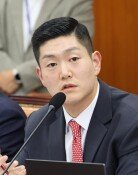[Editorial] Tax Shock
President Roh Moo-hyuns statement last week that I am not arguing for immediate tax increases should not be trusted. Even as he spoke, officials at the Ministry of Finance and Economy (MOFE), were busy trying to collect higher taxes.
Their first targets were salary earners. The government said it would eliminate additional tax benefits on earned incomes of double-income households and households with one or two children. If it does so, the government will be able to collect extra taxes worth about 500 billion won a year. In other words, the six million households estimated to be in this bracket would have to pay an extra 40,000 to 350,000 won a year according to their income levels. This bracket is the one that has already paid heavier burdens than the self-employed as their tax sources are completely exposed. They may bear the brunt of a tax increase once again.
If there are fewer children, the tax credit per head increases, which is contrary to the governments policy to encourage more births. So its possible removal is being reviewed, a MOFE spokesperson said. The MOFE should produce data showing how such a tax increase would encourage more households to give births.
In addition, the government has decided to decrease the tax credit rate for temporary investment from 10 percent to seven percent starting this year to boost investment and to ensure that extra taxes worth 500 billion won could be collected from this. Moreover, the government pledged with its August 31 comprehensive real-estate plan that the possession tax and capital gain tax will increase, but transaction taxes, including the registration tax and acquisition tax will decrease.
But the government is not keeping its promise. That is because it was only thinking about collecting more taxes.
Tax increases do not just mean creating new taxes or increasing tax rates. They include what the government is currently doing: increasing tax revenues. The government says it will spend the money resolving socio-economic divides and strengthening the social security net. Given the costs of the tax collection, however, partial leakage or inefficient waste is possible, and wealth is unlikely to be redistributed.
It is even possible that the tensions on the subject of taxes between the Roh administration and taxpayers will get worse.







